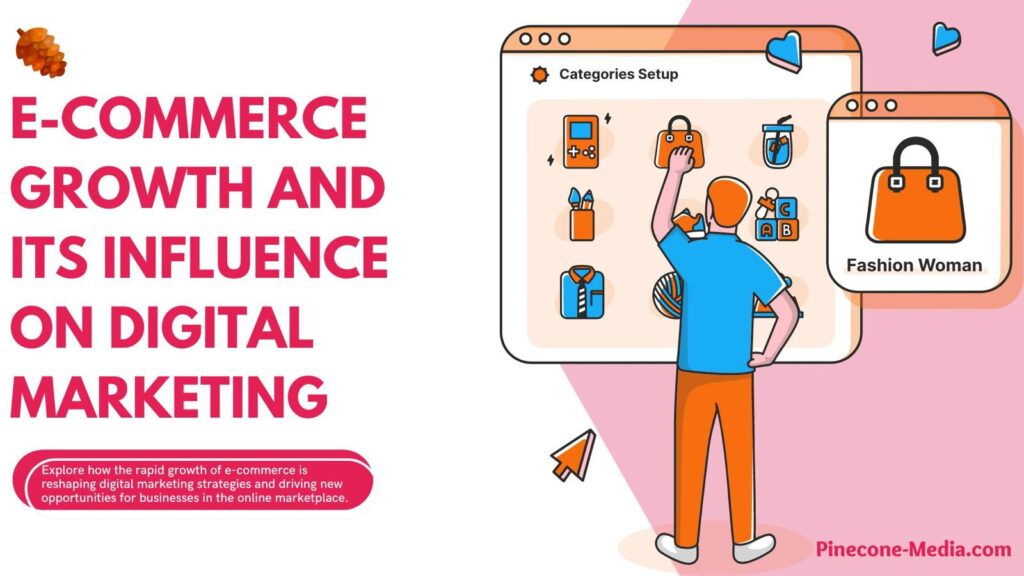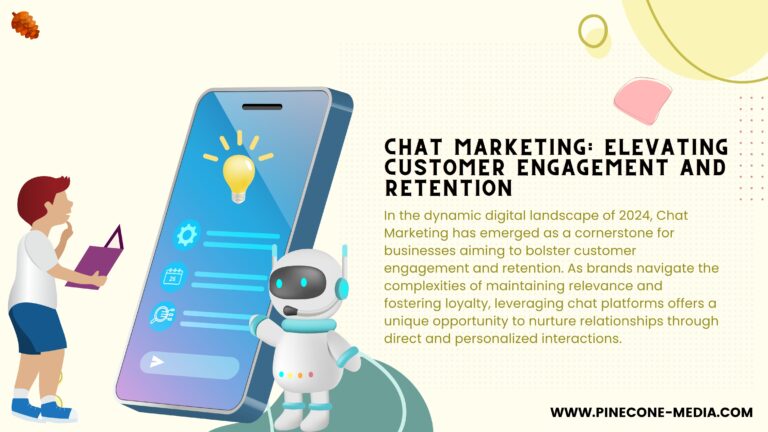E-commerce Growth and Its Influence on Digital Marketing
The rise of e-commerce has drastically transformed the way businesses operate and engage with consumers. As more people turn to online shopping, the influence of e-commerce on digital marketing has become undeniable. This shift has opened new opportunities for businesses to enhance their marketing strategies, leverage data, and reach broader audiences. At Pinecone Media, we explore the growth of e-commerce and how it’s reshaping the digital marketing landscape.

The Rapid Growth of E-commerce
E-commerce has seen unprecedented growth in recent years, accelerated by technological advancements and changing consumer behaviors. With the convenience of online shopping, consumers can purchase products anytime, anywhere, without the limitations of brick-and-mortar stores. In 2024, global e-commerce sales are expected to reach new heights, driven by factors such as:
- Increased internet penetration and mobile device usage
- The rise of social commerce and shopping on social media platforms
- Growing trust in online payment methods and secure transactions
- Expanded shipping and logistics capabilities that make global commerce accessible
This e-commerce boom has had a profound influence on digital marketing, requiring brands to adapt their strategies to meet evolving consumer expectations.
How E-commerce Has Influenced Digital Marketing
- Data-Driven Marketing- One of the most significant impacts of e-commerce on digital marketing is the use of data. E-commerce platforms generate vast amounts of customer data, including browsing behavior, purchase history, and demographics. Marketers can analyze this data to gain insights into customer preferences and behaviors, allowing for more personalized and targeted marketing campaigns.
Data-driven marketing enables businesses to:
- Create highly targeted ads based on user behavior and interests
- Develop personalized email marketing campaigns that offer tailored product recommendations
- Track and measure marketing performance in real-time to optimize campaigns for better results
- Omnichannel Marketing Strategies- E-commerce has also fueled the rise of omnichannel marketing, where brands create seamless and integrated customer experiences across multiple touchpoints. Consumers now interact with brands through various channels, including websites, social media, mobile apps, and email. To succeed in the e-commerce landscape, businesses must deliver a consistent message and experience across all platforms.
Omnichannel marketing strategies can:
- Increase brand visibility and engagement by reaching customers where they spend their time
- Provide a unified experience, whether customers are shopping online, in-store, or on a mobile device
- Improve customer retention by offering a cohesive journey that meets customer needs at every stage
- Content Marketing and SEO- With more businesses competing in the digital space, the demand for high-quality content has grown. Content marketing and search engine optimization (SEO) have become critical components of e-commerce success. Brands that create valuable, informative content can improve their search engine rankings and attract organic traffic to their online stores.
Content marketing and SEO strategies include:
- Writing blog posts, guides, and product descriptions that answer customer questions and solve problems
- Optimizing product pages with relevant keywords to rank higher in search results
- Producing videos, infographics, and other visual content to enhance engagement and shareability
- Social Media and Influencer Marketing- Social media has become a powerful channel for e-commerce, with platforms like Instagram, Facebook, and TikTok integrating shopping features directly into their apps. This has led to the rise of social commerce, where users can discover and purchase products without leaving their favorite social media platforms.
Additionally, influencer marketing has gained prominence in e-commerce. Brands collaborate with influencers to promote products, leverage their large followings, and create authentic content that resonates with target audiences.
- Mobile Optimization- With the increasing use of smartphones for online shopping, mobile optimization has become essential for e-commerce success. Businesses must ensure that their websites are mobile-friendly and provide a seamless shopping experience on smaller screens.
Mobile optimization strategies include:
- Responsive website design that adapts to different screen sizes
- Streamlined checkout processes for mobile users
- Mobile-friendly payment methods like digital wallets and one-click payments
The rapid growth of e-commerce has dramatically influenced digital marketing, requiring businesses to adopt data-driven, omnichannel strategies to stay competitive. From personalized marketing to mobile optimization, the e-commerce landscape offers vast opportunities for brands to connect with consumers and drive online sales. At Pinecone Media, we help businesses navigate the ever-changing world of e-commerce and digital marketing, ensuring that their strategies are aligned for success in the digital age.
E-commerce Growth, Digital Marketing, Online Shopping, E-commerce Trends, Marketing Strategies




